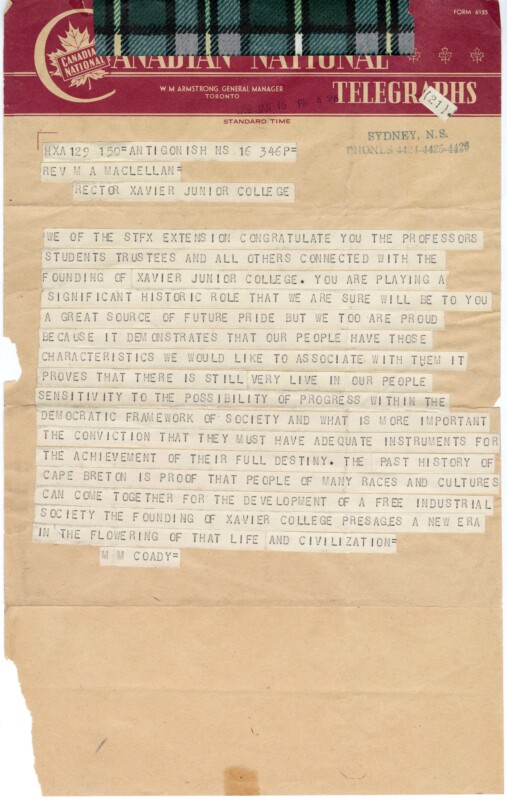In a time before emails and instant messages, a telegram carried weight and significance. In 1952, one such telegram from the Rt. Rev. Dr. Moses M. Coady, the founding Director of the St. Francis Xavier University (StFX) Extension Department, was more than a simple celebratory message. The Antigonish telegram was wired to Rt. Rev. Msgr. Malcolm A. MacLellan, the first Director of Xavier Junior College (XJC), to congratulate him on the grand opening of the College. This moment set in motion the events that would lead to Xavier Junior College becoming an independent institution, shaping the future of higher education on Cape Breton Island.

Scan of the original telegram from Rt. Rev. Dr. M. M. Coady. Beaton Institute, Cape Breton University.
Xavier Junior College, also known as the Sydney campus of StFX, Xavier College or "Little X," was established as a satellite campus to handle the rapid population growth in Industrial Cape Breton. With Cape Breton's population increasing, the industries declining and local students facing challenges travelling off the Island, StFX offered preparatory courses in Sydney to retain these students. The decision to locate the College in Sydney was influenced by Bishop of Antigonish, Rev. John R. MacDonald, a Cape Bretoner, who suggested using the underutilized Lyceum building on George Street as the College's new home. Renovations to the Lyceum, along with temporary use of other buildings in Sydney's north end such as the Navy League Building, allowed Xavier Junior College to begin its inaugural classes on September 17, 1951. Initial enrollment was 60 full-time and 85 part-time students, supported by a staff of eight educators.
"The past history of Cape Breton is proof that people of many races and cultures can come together for the development of a free industrial society," Dr. Coady wrote. "The founding of Xavier College presages a new era in the flowering of that life and civilization."
For the next two decades, the College thrived as a feeder institution, providing an academic foundation for students who would go on to complete their degrees at StFX or other post-secondary institutions in Nova Scotia. However, the vision for Xavier College extended beyond its role as a preparatory institution. The local community and industry members began to recognize the potential for the College to become an independent entity that could address the unique educational and economic needs of the Island, and they worked tirelessly to make this vision a reality.
Twenty-three years after receiving that encouraging telegram, an Act was passed to establish the College of Cape Breton (CCB) as an independent post-secondary institution with an autonomous Board of Governors on June 28, 1974. CCB merged Xavier College and the Nova Scotia Eastern Institute of Technology (NSEIT) into one entity, with planning in place for relocation and expansion. The present-day CBU campus is on the existing site of NSEIT on Grand Lake Road.
Since 1974, the campus has seen significant growth, including the construction of the Campus Centre, the Student, Culture and Heritage Centre and four student residence buildings, to name a few. This marked the beginning of a new era, where the College could chart its own course and directly contribute to the development of its community. In 1982, CCB was awarded degree-granting status and was renamed the University College of Cape Breton (UCCB). In 2005, UCCB was renamed Cape Breton University, continuing its journey of growth and excellence.
The legacy of Rt. Rev. Dr. M. M. Coady's telegram lives on as a reminder of the importance of support, recognition and belief in the potential of educational institutions. It laid the groundwork for Xavier Junior College's eventual independence and continues to inspire future generations to strive for excellence and innovation in education. Today, as we reflect on this remarkable journey, we celebrate not only the achievements of the past but also the bright future that lies ahead for Cape Breton University.
The original telegram is now in its display case as part of the exhibit Cape Breton University: 50 Years in the Making at the Old Sydney Society's Sydney Museum (173 Charlotte Street, Sydney). The exhibit is open to the public from now until November 15, 2024, during the Museum's regular opening hours: Tuesday-Friday: 9:00am-5:00pm and Saturday: 10:00am-4:00pm.













